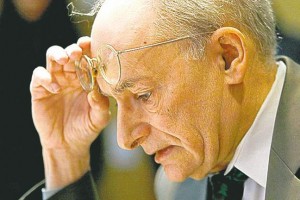Stop drug trials in China: Matas
City lawyer fears use of executed prisoners’ organs
By Carl Sanders
Winnipeg Free Press, August 10, 2012

A Winnipeg human rights lawyer is trying to prevent a Canadian drug company from testing its kidney-transplant medication in China where prisoners — not voluntary donors — provide most organs.
“I’d like them to stop,” said David Matas, who’s written to the Edmonton company asking it not to do the drug trial in China, and to the authorities in Canada and the United States asking them not to accept the trial’s results.
Edmonton-based Isotechnika Pharma Inc. is about to commence clinical trials of the anti-rejection drug Voclosporin in kidney transplant patients in China with the Chinese company 3SBio.
“China has a system that’s neither transparent nor accountable,” said Matas. Ethically, anybody involved in these trials has to wonder about the source of transplanted organs, he said.
“The government of China acknowledges, literally, all organs come from prisoners,” said Matas, citing quotes by Chinese deputy Minister of Health Huang Jiefu. “In China, more than 90 per cent of transplanted organs are obtained from executed prisoners,” the minister reportedly said in 2008.
Matas and Ontario Liberal MP David Kilgour say the bulk of prisoners are locked up for practising Falun Gong, a physical and meditative form of spirituality banned in China.
The head of the Canadian drug company said he knows there are concerns about China but he’s certain the trial will be conducted ethically.
“In the transplant world, it has been known for a long time that things can be a little bit iffy when it comes to organ transplant in China,” said Isotechnika chairman and CEO Robert Foster in Edmonton.
“One thing we’ve prided ourselves on being is a really, highly reputable company,” he said.
In China, Isotechnika will only test its drug on people who received an organ transplant donated by a living relative, he said, and they will test tissue samples to make sure they’re a match.
“We’re going to set the bar really high,” said Foster. The company is spending $60 million on the trial and doesn’t want to throw it away on test results that go “up in smoke,” said Foster.
“It doesn’t make sense,” he said.
But with no accountability or transparency in China, Matas maintains there’s no way the Edmonton company or drug-approving authorities can be sure of the source of the organs.
“There is nothing now in place, as far as we can see, that would allow your agency to be satisfied beyond a reasonable doubt that the sourcing of the organs for the clinical trials of Voclosporin is proper,” he said in a letter to Health Canada and the U.S. Food and Drug Administration.
Challenging the ethics of organ transplant in China and a Canadian drug company’s role is the right thing to do but it’s just one front in a bigger battle, said Prof. Arthur Schafer, director of the University of Manitoba’s Centre for Professional and Applied Ethics.
“Virtually all drug trials being carried out by major international companies in the Third World don’t involve informed consent” or meet ethical safety standards, said Schafer.
The outsourcing of drug trials conducted by for-profit research companies over the last 10 years is to blame, he said. “It’s much less expensive in desperately poor countries with research subjects whose understanding is very weak of the risks and benefits to them, who may be paid small amounts that are huge to them,” said Schafer.
“The fact that other people are doing it doesn’t mean we get a free pass because we’re smaller or Canadian,” said Schafer, who supports Matas. “It’s legitimate to point out the ethical abuses,” he said. “I think our concerns should start with Canadian research.
“The whole system fails the test of integrity and humanity. I share his concerns but they’re much wider than China.”
